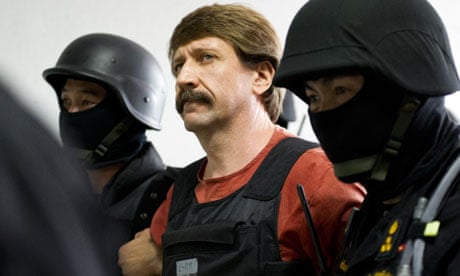Former associates of convicted international arms dealer Viktor Bout exploited loopholes to set up a global trafficking ring with their sights set on selling weapons to war-torn countries like Sudan, Somalia, Iran and possibly Syria, an investigation has revealed.
The report, by Kathi Lynn Austin, a former UN arms investigator and executive director of Conflict Awareness Project (Cap) shows how close two of Bout's lieutenants came to establishing a fresh gunrunning network in the wake of his conviction last year, despite being under US government watch or subject to US sanctions.
At a press conference on Tuesday at the UN in New York, where representatives from 190 countries are midway through negotiations over the first Arms Trade Treaty, Austin said: "These brokers go to extreme lengths to reap profits form conflict, atrocity and UN sanctions-busting. As we speak, gunrunners are out there exploiting every loophole in a global arms trade that is out of control."
The six-week investigation describes how "classic techniques" of illicit arms brokers were used including flags of convenience, money laundering and establishing multiple layers of "shell companies" to evade detection and accountability.
The investigation also uncovered new techniques, including a switch away from a previous reliance on aging Russian aircraft to predominately western passenger planes.
The men at the heart of the investigation are two Russians, Sergei Denisenko and Andrei Kosolapov, former associates of Bout, whose gunrunning networks enabled the flow of arms into African conflict including the Democratic Republic of Congo, Angola, and Sudan.
It shows how, even with Bout in prison and US sanctions against them, they were able to circumvent laws and set up US business partners. Denisenko is on the US Special Designated Nationals (SDN) List enforced by the department of treasury, because of his past trafficking activities in Liberia, according to the report.
His SDN listing prohibits US companied dealing with him. Kosolapov is on the US Visas Viper list, a watch list used internationally by the state department to track known or suspected terrorists, according to the report titled Viktor Bout's Gunrunning Sucessors: A Lethal Game of Catch Me if you Can.
Their plan was to lease a US-registered plane that could be used for arms transfers while flying under a Mauritian aviation certificate.
The report found that the Denisenko-Kosolapov partnership engaged a number of subcompanies and business partners including US, UK, Finnish and Mauritian companies.
One aircraft was located in Bangor, Maine. Human rights advocacy group Human Rights First said the report demonstrated gaps in implementation and enforcement of US sanction regimes.
Sadia Hameed, of Human Rights First, said: "Countries that may have more robust regulations, like the United States, are still unable to singlehandedly prevent illicit arms trafficking operations."
She said more could have been done by the US to share information with their embassy in Mauritius about Denisenkio and Kosolapov and that it should do more to ensure SDN guidelines are followed by US companies.
"The fact that through Kathi Lynn Austin's investigations she was able to uncover that they very nearly aquired a US-registered plane and that that plane was intended to service whatever the forward activities of the network were, points out gaps in due diligence of sanctions."
A US company illegally provided parts and maintenance for the aircraft leased by the pair, according to the report and US pilots were lined up to fly it, which is also illegal.
In early July, the Mauritius Department of Civil Aviation denied the Denisenko-Kosalopov operations application for an Air Operation Certificate – which any plane needs to be able to fly, effectively stopping the operation.
"The multi-jurisdictional nature of arms trafficking rings is why we need a strong arms control, "said Austin. "The Mauritian government said, 'How were we to know that this US individual was on a designated list?' A strong arms control treaty would identify who the criminals are and who the traders are."
In a statement, a spokesman for the US treasury department said: "Sergei (or Serguei) Denissenko was sanctioned by OFAC (Office of Foreign Assets Control) for being involved in two of Bout's front companies – San Air General Trading FZE (Ajman, UAE; Richardson, Texas) and also with Centrafricain Airlines. US firms are prohibited from doing business with him as with any other sanctioned parties. OFAC does not have an Andrei Kosolapov on its SDN list."
Campaigners for arms control expressed concern that, after an opening week characterised by delays, international delegates still do not have the basis for negotiations on most of the key elements of the treaty. The optimistic view is that there will be a negotiating text by Wednesday.
The Arms Trade Treaty faces opposition from Egypt, Syria, Algeria, Iran, Cuba and North Korea. However, Russia, China, the UK, France and the US have issued some joint statements in support. The US would like to see ammunition removed from the treaty and wants to water down the rule on human rights.
